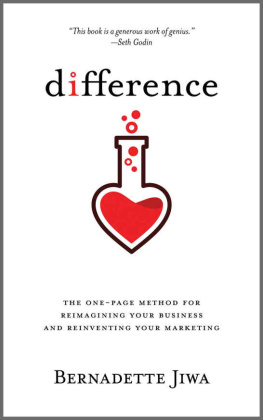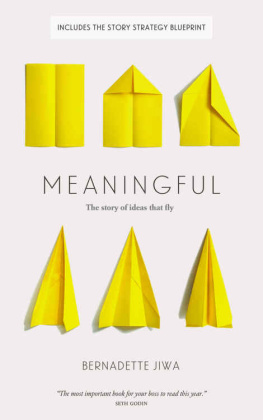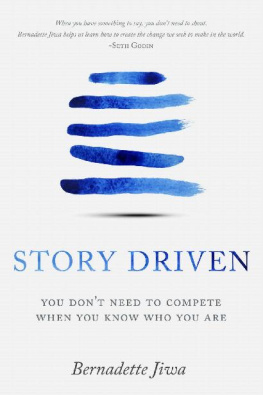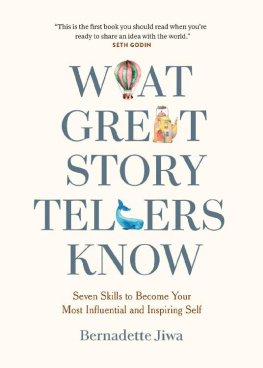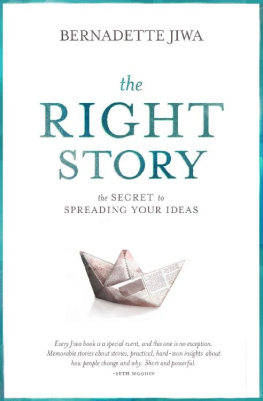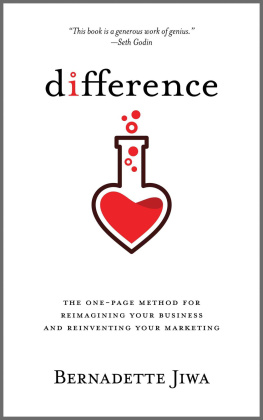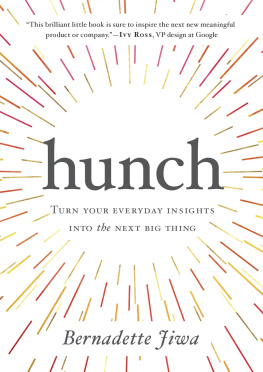Bernadette Jiwa - Difference
Here you can read online Bernadette Jiwa - Difference full text of the book (entire story) in english for free. Download pdf and epub, get meaning, cover and reviews about this ebook. year: 0, genre: Business. Description of the work, (preface) as well as reviews are available. Best literature library LitArk.com created for fans of good reading and offers a wide selection of genres:
Romance novel
Science fiction
Adventure
Detective
Science
History
Home and family
Prose
Art
Politics
Computer
Non-fiction
Religion
Business
Children
Humor
Choose a favorite category and find really read worthwhile books. Enjoy immersion in the world of imagination, feel the emotions of the characters or learn something new for yourself, make an fascinating discovery.
- Book:Difference
- Author:
- Genre:
- Year:0
- Rating:5 / 5
- Favourites:Add to favourites
- Your mark:
- 100
- 1
- 2
- 3
- 4
- 5
Difference: summary, description and annotation
We offer to read an annotation, description, summary or preface (depends on what the author of the book "Difference" wrote himself). If you haven't found the necessary information about the book — write in the comments, we will try to find it.
Difference — read online for free the complete book (whole text) full work
Below is the text of the book, divided by pages. System saving the place of the last page read, allows you to conveniently read the book "Difference" online for free, without having to search again every time where you left off. Put a bookmark, and you can go to the page where you finished reading at any time.
Font size:
Interval:
Bookmark:
Praise for
This book is a generous work of genius. The Difference Map is now an essential component for anyone who is serious about doing work that matters, and Bernadette Jiwa is the bright new star to lead us there.
SETH GODIN, AUTHOR OF LINCHPIN
An inspiring read and a truly powerful tool. Bernadette is a rare find she doesn't just know what shes talking about, shes not afraid to stand for why it matters. What better way to describe the challenge we all face in trying to make real connections in todays world?
JONATHAN RAYMOND, EMYTH, CHIEF BRAND OFFICER
Have you wondered about that certain something that makes an extraordinary business? Bernadettes stylish little book is that certain something explained.
MARK SCHAEFER, AUTHOR OF RETURN ON INFLUENCE AND THE TAO OF TWITTER
Bernadette is the Banksy of the marketing world.
MERRYN PADGETT, FOUNDER OF EARTH & SEA CREATIVE
THE ONE-PAGE METHOD FOR
REIMAGINING YOUR BUSINESS AND
REINVENTING YOUR MARKETING
THE STORY OF TELLING PRESS
AUSTRALIA
Copyright 2014 by Bernadette Jiwa
All rights reserved.
Published in Australia by The Story of Telling Press.
www.thestoryoftelling.com
Portions of this book have appeared previously on
TheStoryofTelling.com blog.
Library of Congress Cataloging-in-Publication Data
Jiwa, Bernadette
difference : the one-page method for reimagining your business and reinventing your marketing / by Bernadette Jiwa
p. cm.
1. Marketing. 2. Business Development. I. Title.
II. Title: difference
ISBN 978-1494842710
Printed in the United States of America
Book and Jacket Design: Reese Spykerman
10 9 8 7 6 5 4 3 2 1
First Edition
For my boys
Introduction
THINKING DIFFERENCE
During the 70s a small team of some of the worlds best computer engineers was working in Silicon Valley at PARC, Xeroxs research and innovation division. Their task was to take the companys vision for the office of the future and make it a reality. Everyone who was anyone in the Valley knew that Xerox was at the leading edge of what the future would look like. These engineers were working on a bunch of things, one of which was improving upon a pointing device that was designed to be used with a computera pointing device that we now know as the mouse. The idea wasnt new and it hadnt been hatched by the team at PARC; the first prototype of the mouse, invented by Doug Engelbart, had actually been around since the 60s.
On a rare occasion in 1979, when a select group of visitors was invited to see what the PARC team was working on, scientist Larry Tesler demonstrated how a computer with icons on the screen could be controlled by this pointing device. It just so happened that one of the visitors that day was Steve Jobs. The story goes that as soon as he saw what would become the modern-day mouse in action, Jobs began pacing the room excitedly, and when he finally couldnt contain himself any longer, he said, youre sitting on a gold mine. And this is insanely great. For the life of him, Steve Jobs couldnt understand why Xerox wasnt doing anything with this invention.
While the PARC team focused on developing the product they thought the mouse would eventually becomea $300 accessory built as part of a costly business computerSteve Jobs had other ideas. A day or two after his visit to Xerox, Jobs met with design consultant Dean Hovey and told him to forget about everything else he was working on for Apple. Jobs knew exactly what they must do next.
The design brief he gave Hovey for the mouse was simple. There were just four criteria:
1. It had to be built for less than $15.
2. It had to last for two years.
3. It needed to work on a typical desktop of Formica or metal.
4. And it had to work on Jobs Levis.
Its clear that Jobs vision from the start was that the mouse should be designed as an affordable consumer product. He had flipped the traditional product development model on its head. Instead of thinking about the features and function of the product in isolation, Jobs made a leap to consider what the product might mean to potential customers. He wasnt concerned so much with what the innovation did; he was more excited about what it would enable people to do. Now, instead of memorizing and typing long commands on a text-based screen, users could point to an icon and click or drag. Imagine the difference between typing a command like
move c:\clients\apple\sjobs.txt
a:\billing\invoices\sjobs.txt
and just dragging the files icon to the folder you wanted to move it to.
When the A pple Macintosh was launched in January 1984, it was the first mass-market personal computer to feature a graphical user interface and a mouse. And that changed everything.
Malcolm Gladwell describes Jobs as a tweaker who was endlessly refining the same territory he had claimed as a young man. Others have said that he was an editor with an instinct for innovation, and not an inventor at all. But Jobs real genius was that he had learned how to see and he operated with an understanding of and empathy for the people who would become future users of Apple productsdevices like the iPad that would make our heart sing. As Hovey said, Jobs connected the dots and was brilliant at figuring out what a computer ought to be for the rest of us. Steve Jobs was what I call a difference thinker.
Difference thinking is more than the ability to connect the dots, though. Its about seeing the truth, recognising the opportunity in that truth and then acting on it. You need to learn how to see the dots and understand the significance of connecting them before you can begin. And you can do that only by identifying with and understanding somebody elses feelings and frustrations. Thats what Steve Jobs did intuitively; he had the ability to stand in a potential users shoes and understand the impact that an innovation and its design might have on that persons life (and thus in the market). This is something you can train yourself to do, too.
BEING DIFFERENT VS. CREATING DIFFERENCE
Business has traditionally seen innovation as something that is incremental. We constantly strive to be different from or to outdo the competition, so we build on what already exists, to either create big changes or make small improvements. We tweak, give a bit extra, or perhaps add one more feature, and then we figure out ways to get people to notice how were different so we can convince them to buy our products and services. This thinking has led us to bring things to market in a way that looks something like this:
IDEA> DEVELOP>LAUNCH>MARKET
In contrast, difference thinkers dont begin with an idea and think in increments of improvement; they start with empathy. This gives them the ability to take what is and understand what could be. The product or service that is born from creating difference in this way is the marketing.
An idea developed with difference thinking looks like this:
TRUTH>PEOPLE>IDEA>LAUNCH
This is how the now-ubiquitous humble shopping cart was invented and adopted eighty years ago. Sylvan Goldman, a grocery store owner from Oklahoma, noticed that when his customers baskets became too heavy or too full, people stopped shopping. Clearly their problem was his problem, too. He began to think of ways to improve the experience for his customers. In 1936 he came up with the idea of a basket carrier on wheels. The concept was developed from the simple idea of using a folding chair as a framework to carry two baskets. A year and several iterations later, Goldman launched the new folding basket carrier in his stores. The strange thing was that even though it was designed to make their lives easier, customers hated the shopping cart. They didnt warm to using it at all. Men worried that they would look weak if they couldnt haul a heavy load of groceries. Young women thought that the carts were unfashionable, and older people didnt want to appear helpless by using them.
Font size:
Interval:
Bookmark:
Similar books «Difference»
Look at similar books to Difference. We have selected literature similar in name and meaning in the hope of providing readers with more options to find new, interesting, not yet read works.
Discussion, reviews of the book Difference and just readers' own opinions. Leave your comments, write what you think about the work, its meaning or the main characters. Specify what exactly you liked and what you didn't like, and why you think so.

